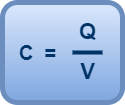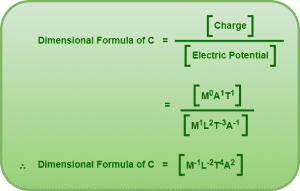Electrical Capacitance of A Conductor-
| The electrical capacitance of a conductor is a measure of its ability to store electric charge or energy. |
It is a positive scalar quantity.
Capacitance Formula-
When a conductor is given some charge, it acquires a certain electric potential.
More is the charge on a conductor, more is the electric potential of it.
If a charge Q is put on a conductor which raises its potential by V, then-

Or we can write-

where C is a constant of proportionality called as electrical capacitance of the conductor.
From here, we have-

OR

If V = 1 unit, then C = Q. Thus,
| The electrical capacitance of a conductor may be defined as the charge required to raise its potential by a unit amount. |
Factors Affecting Capacitance-
The capacitance of a conductor depends upon the following factors-
- shape and size of the conductor
- nature (permittivity) of the surrounding medium
- presence of the other conductors in its neighborhood
It is worth noticing that the capacitance of a conductor does not depend on the-
- nature of material of the conductor
- amount of charge existing on the conductor
SI Unit of Capacitance-
| The SI unit of capacitance is farad (F). |
1 F = 1 C V-1
The capacitance of conductor is said to be one farad if one coulomb of charge is required to raise its potential by 1 volt.
It is important to note that one farad is a very large unit of capacitance. Other smaller and practical units of capacitance are-
- 1 micro farad (μF) = 10-6 F
- 1 nano farad (nF) = 10-9 F
- 1 pico farad (pF or μμF) = 10-12 F
Dimensional Formula of Capacitance-
| The dimensional formula of capacitance is [M-1L-2T4A2]. |
It can be derived as-

Also Read- Deriving Dimensional Formula of Electric Potential
Read the next article on-
Capacitance of Isolated Spherical Conductor
Get more notes & other study material of the Chapter Electrostatic Potential & Capacitance.

